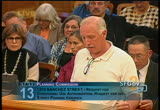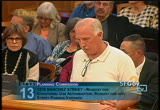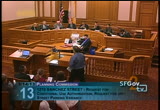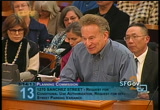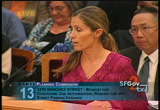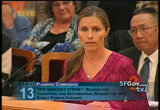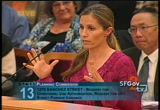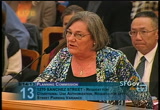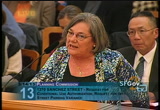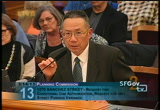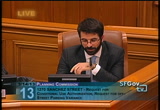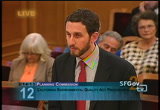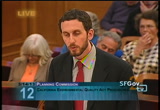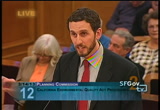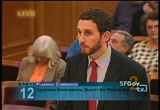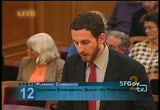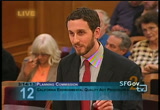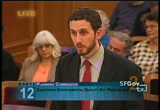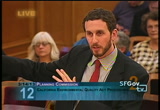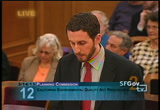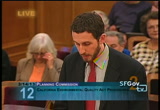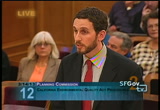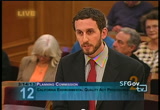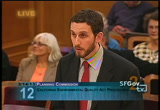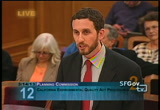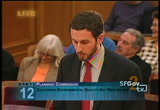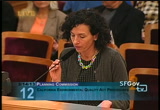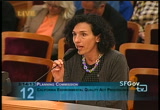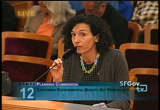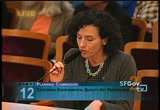tv [untitled] March 14, 2013 6:00pm-6:30pm PDT
6:00 pm
project and this change to this facility. they would expect a traffic plan. they would normally expect somebody to supervise pick ups and drop offs. james lick, a school up the street, has crossing guards and has a lot of problems with traffic and the interaction of children and the cars around there. there should be some way especially to prevent the back up of the cars which will line up in front of the school to drop off from backing up onto clipper street. clipper street to the locals is known as the clipper freeway, and since i have three accidents to contribute to that opinion, it can be a very dangerous street in the morning. should the cars in front of the drop-off back up more than four cars, they will start, you know, having their blinkers on and their flashers on and leave their car and it will create a really dangerous situation there, which i know they really don't want. you know, this is a change to
6:01 pm
the neighborhood and has a significant impact on what is a residential area. the church brings a business in, when you bring a business with traffic impact, that business is burdened with showing how they'll mitigate those traffic issues. the other thing is the -- what happens if you have kids that you dropped off at school, everybody will park on both sides of sanchez street with their flashers on. i pray nothing happens to any of those children. so, i believe we'd like to see the project and project sponsors reach out to the neighborhood and show how that's not going to end up being one of those really bad and dangerous traffic situations from this change. thank you. >> next speaker, if you're ready. commissioners, i'm john goldman, principal of goldman architects, the architect of this project. i'm here just to note that the drawings that you see in front of you represent a project
6:02 pm
that's now complete. originally there was going to be a fellowship hall down where the school is going in. so, i'm here just to say how well this new use works in the building because the fellowship hawes has a series of french doors providing direct access to the courtyard. the place is flooded with daylight. ~ all the kids and parents who visited enjoyed the space. i think it's a really good use of the church. as chris pointed out, the space is under used during the week and this creates an opportunity for the parents in the neighborhood, which is greatly under served by this -- by pre-schools, which i'm sure kathleen will speak to. so, i'm here just to say that the architecture supports the use as well. if you have any questions about the plans, i certainly can answer them. >> thank you.
6:03 pm
hi, my name is kathleen muldevan. i'm the owner and founder of the muldevan academy. i'd like to thank you, president fong and commissioners, for this evening and your time. i want to address some of the issues that have been brought up. one, bethany united methodist church picked me and my preschool academy primarily because we are not ~ just a day care center with an intention of just watching the children. we are an educational institution with a world renowned curriculum and we are here to teach young children. this is a well-researched program. it's not an arbitrary day care center. so, bethany united methodist church chose a very high-quality program to go into this space. so, it will not be a play-based
6:04 pm
day care center. we have started this process over a year ago. so, the community is aware of that, bethany united methodist church is looking to put a preschool, and particularly our preschool in their location. so, we have attracted a lot of attention. we have begun the application process. and we have met with over 100 of families. we have well over 100 applicants. and i can tell you that over 90% of the applicants live in the neighborhood. and what's making this preschool so attractive to them, of course, not only the high-quality educational program, but the fact that we are in their neighborhood and at walking distance. a lot of the families that have come to meet with me complain about having to get in their car and drive their child to a preschool, you know, in another neighborhood. they're really excited to walk their children to school. so, i really want to impress that upon you this evening that
6:05 pm
this is a big attractive feature for the local community in noe valley that this preschool is here and it's in walking distance. we will be a state license facility. we are not allowed to operate otherwise. and in doing so, we are held to state guidelines. one being that we cannot have unsupervised drop-off or pick ups. they have to be supervise. you can't just drop off your child and there's no provider there to greet them. in muldevan academy we have a very organized system of [inaudible] and pick up. we will have crossing guards, and we have approximately 30 families a day. we anticipate with staggered drop off times. not all 30 families will be coming at once. it will be staggered between 8:00 and 10:00 a.m. and the pick ups will be staggered between 2:00 and 6:00. so, it won't be a giant crowd of people showing up all at
6:06 pm
once showing up to drop off and pick up their children. again, families will be mainly walking their children to and from school. thank you very much. >> thank you. next speaker, please. hello. my name is kate nemeth and i'm a resident of noe valley and i'm unique in the fact that i am a resident of noe valley. i am a member of the bethany united methodist congregation. and i was on the faculty for the muldevan academy in sonoma. so, on three different levels i'm very familiar with what is proposed before us. i would just like to say that san francisco, it is my understanding that san francisco would like to be knowns as a family-friendly
6:07 pm
city and noe valley is a family community. so, before -- and i also would like to mention that the muldevane academy is an award winning school for safety. so, that is -- if that is a primary concern, that is addressed in the fact of their sterling record. but kathleen and myself did canvas the neighborhood. we went to farmers market. we talked to parents. and the need is very great. and for myself, it's a wonderful feeling that i am helping to fill the need of my community in providing a quality -- a quality school for the children in the neighborhood.
6:08 pm
so, it is my hope that you will approve this. thank you. >> thank you. next speaker. okay, seeing no further comment -- no public comment, public comment is closed. commissioner sugaya. >> yes, i'd like to ask, i don't know, either staff or mr. goldman. the plans that were submitted are labeled for the conditional use. but mr. goldman just testified that the work has already been completed on the building. so, really, the plans that were submitted, we're not approving any of the architecture work at this point. is that correct? >> that is correct. there's no exterior or interior work proposed under this application. the church received a major renovation interior and exterior completed in june 2012. >> okay. i guess that was confusing because when i read that there were no exterior changes, but
6:09 pm
the plans are full of exterior changes, so, that was a little confusing to me. if that's the case, then i don't have any issues. so, make a motion to approve [speaker not understood]. >> second. >> would you call the question, please? >> on that motion to approve with conditionses, commissioner antonini? >> aye. >> commissioner borden? >> aye. >> commissioner hillis? >> aye. >> commissioner moore? >> aye. >> commissioner sugaya? >> aye. >> commissioner wu? >> aye. >> and commission president fong? >> aye. >> so moved, commissioner, that motion passes unanimously 7 to 0. zoning administrator. >> the variance closed, [speaker not understood] granting requested variance off-street parking would result in the loss of on-street parking and alterations to the building which is a potential historic resource. if anyone would like a copy of the decision letter, please inform staff. >> congratulations. >> commissioners, that will place you back on item 12 for
6:10 pm
case no. 2012.1329u, california environmental quality act procedures. >> good evening, commissioners, amy rodgers planning department staff. i'm joined for this item sara jones, acting environmental review officer. before we begin our staff presentation i'd like to invite supervisor wiener up to make his remarks. >> hello again, commissioners. thank you for your [speaker not understood]. so, since the last time we were together on this item in november, i have as you requested convened a series of very well attended round tables with people in the community, some in support, some in opposition, some in the middle. we've also had other meetings with individuals who have been
6:11 pm
interested or organizations, and we've been listening and we've been dialoguing. resulting from these conversations, i have made 34 different amendments covering 26 subject matters into the legislation that is before you today. this legislation for the first time will put in place a clear and transparent statutory procedure forsee qua appeals of categorical exemptionses and negative declarations to the board of supervisors. ~ for c-e-q-a it is important reform for our process which is chaotic the opposite of transparent and which is unpredictable. it is a process that undermines public participation by being confusing to the point that really only skilled and experienced insiders actually know how to navigate it. it is a process that is the opposite of good government.
6:12 pm
this legislation has no subtantive impact on c-e-q-a. despite some of the dramatic claims that this is, quote-unquote, gutting c-e-q-a, we of course had no power to amend c-e-q-a locally. this legislate ace is totally separate from the proposal circulating in sacramento to potentially amend c-e-q-a in one way or another. ~ legislation this legislation merely sets our procedures for how we allow appeal. and i want to note that there are organizations that are very active opposing the proposed changes in sacramento to c-e-q-a itself. those organizations are not opposing this legislation. in fact, we just heard today that the state building and constructions trade councilmember which has been one of the leaders fighting the changes to c-e-q-a in sacramento has officially stated that they have no issue with what we are doing here in sacramento. ~ council today i'm sure you'll hear some
6:13 pm
of the same arguments we heard last time. there will be criticisms of the process around this legislation. and as i noted, we have gone through exhaustive public process. before your last hearing we had already had a number of meetings and made amendments and we did so after. there will again be claims that this is some sort of developer scheme or plot which is entirely untrue. c-e-q-a appeals, as you know, and as i know, impacts things from bike lanes to affordable housing projects and park projects, small residential projects, and other projects that are anything but developer schemed. in fact, i'll let you know that various organizations have endorsed this legislation, including mercy housing which is one of the largest affordable housing providers in san francisco, the san francisco bike coalition has endorsed it, walk san francisco, spur, the sheet metal workers local 104, and
6:14 pm
the planning association for the richmond. and i will note as you may recall, par was one of the lead appellants, c-e-q-a appellants against the at&t boxes and was a plaintiff in that c-e-q-a lawsuit. par is an organization that understands the importance of c-e-q-a and nevertheless supports this legislation. now, as you know, c-e-q-a exists to ensure proper environmental analysis when we make decisions. c-e-q-a does not exist as a tool to delay projects. our current procedures unfortunately can sometimes be used that way because they are so convoluted that not many people even understand them. now, the planning staff will provide you with a very detailed overview and presentation and i'm not going to go into depth about that. i do want to talk to you about a few key provisions in the legislation. one is to impose for the first
6:15 pm
time a clear deadline for filing appeals under c-e-q-a for cad x's and negative declarations. there is currently not a clear deadline to do so. and as a result, there are many late appeals that are filed. and because of the lack of clarity around when an appeal deadline is, we sometimes have people who miss appeals. and i want to give you a recent example just in response to those who say we're trying to reduce the number of c-e-q-a appeals, that is not the goal here. the goal is to give clarity to people. there was a recent appeal filed to the board of supervisors relating to renovation work being done in glenn canyon. these were very on the ball appellants. and guess what? after two weeks since we have to get a special opinion from the city attorney every time an appeal comes in because no one really knows whether an appeal is timely or not, their appeal is deemed untimely. it was for a very convoluted reason that frankly i still
6:16 pm
don't understand to this day. i had a situation where whether or not i agree with an appellant, they should be able to know when the deadline is. this legislation will also provide that when the board of supervisors is already taking legislative action, that the c-e-q-a determination will be heard at the same time as that legislative action so that we're doing one hearing instead of two at the board. it will also provide that when a c-e-q-a appeal is filed -- right now it freezes everything and no commission or decision maker can take any action. this will allow other process he to proceed as long as it doesn't make a physical change to the property. we also improve public noticing in various respects. the goal is to improve noticing, have good notice and have clear rules and deadlines. we did, as i note in the 34 amendments -- i'm not going to go through all those amendments.
6:17 pm
ly just mention a few of them that i think are significant. in terms of making sure that if a project changes after the c-e-q-a determination is made, there was a concern that if the deadline is after the first entitlement, that a project could change and there wouldn't be a right to appeal. we added clarifying language to make crystal clear the project changes that will need to be a new c-e-q-a determination and there will be new c-e-q-a rights. there was some concern about what the first approval action is that triggers the c-e-q-a appeal deadline and could you have a situation where someone seeks the most minor entitlement [speaker not understood] future permit and saves everything else for later and makes it so that people aren't able to exercise intelligently the c-e-q-a appeal rights. we added a significant and detailed amendment which staff will describe to you to make clear that that could not be
6:18 pm
the case. you can't just do a minor entitlement for which there is not notice and trigger the appeal deadline. we added clarifying language that the historic preservation commission per the charter will continue, have full authority to comment on environmental documents that may impact the resources -- historic resource he. ~ there was concern about that. we had several meeting with heritage and we had clarifying language. it was never our intent to change that charter required procedure. the original ordinance specified that exemptions that are not noticed would only have 20 days to appeal, which isn't enough time. i agree and we introduced an amendment specifying that the appeal period will begin after notice for a public hearing with a posting on the planning department website of the determination. there is also a provision in
6:19 pm
the ordinance that would allow for a consolidated notice for large rezonings. we are already getting notice and it would be unreasonable to require an additional separate c-e-q-a notice. and we had provide that had that would apply to any area plans of five acres or more. we changed that to 20 acres or more so we narrowed the scope. i also understand that planning staff is recommending that the deadline to appeal be extended from 20 days to 30 days after that first entitlement and i agree with that change. and i do intend to amend the legislation assuming that the commission recommends it, to extend the appeal period from 20 to 30 days. now, before i wrap up, i do want to acknowledge what i think you probably already know, that on tuesday supervisor kim introduced a different version of legislation around c-e-q-a appeals. it is my understanding that
6:20 pm
aaron peskin was playing a role in the drafting of that. we have been hearing about that for a while and that now apparently has been introduced at the board. that legislation was not drafted by the city attorney's office. the legislation has not been approved as to form by the city attorney's office. i learned about the introduction of this legislation on early tuesday evening after our board meeting. my understanding is that planning staff and the city attorney did not know about its introduction until after it was introduced. since tuesday evening when we learned about this legislation, we have been trying to review it and analyze it, and we are continuing to do so. from our initial review and analysis, i want to bring several thing to your attention. i believe that this legislation will make our current, already bad c-e-q-a process significantly worse and more convoluted and more time
6:21 pm
consuming and more confusing than it already is rather than simplifying it. to give you a few examples, the legislation as it states, will allow for a separate c-e-q-a appeal for each separate permit granted as part of the project. so, if your project has five different entitlements, someone can file five separate c-e-q-a appeals to the board of supervisors. another provision, for every single building in san francisco that is 50 years or older, which is an overwhelming portion of our building stock, every building 50 years or older and for every single project, no matter what it is, in a park or quote-unquote open space, which is a very broad category, even minor projects on those 50 plus year old buildings, parks or open space would no longer be eligible for a categorical exemption stamp over the counter. instead, the environmental
6:22 pm
review officer would be required to issue a full certificate of exemption. as you know, that is a very detailed document. the estimated fee is in the thousands, maybe $5,000 instead of a $300 fee. it can take months to complete instead of hours or days. and this is for any project relating to those buildings or parks or open space. in addition, for any 50 plus year old building or park or open space, the historic preservation commission will be given authority to hold a hearing to consider each of those certificates of exemption. this is for every change to those buildings or parks and open space. this would be an extraordinary increase in the time, cost, and bureaucracy for even minor projects.
6:23 pm
playground renovation, planting a median with trees, whatever it is, it would apply. in addition, for every single draft negative declaration for a 50 plus year old building, for a park, for an open space, you would be required to go to the historic preservation commission for a hearing, all of them, required hearing at the hpc. this is an unprecedented expansion of the role of the hpc and another increase in cost and time and delay and confusion. the legislation would also require automatic consideration by this commission of a negative declaration even if no one appealed that negative declaration within the statutory period. if there is any subsequent action by the planning commission, anyone could come forward at that time well past the deadline to appeal, and request that the commission consider the negative declaration.
6:24 pm
in addition, the legislation would require this commission to micro manage planning department staff. it would require that this commission would have to approve every single change to any administrative staff bulletin, to any checklist, to any form, to any processing guideline that planning department staff came up with. i'm sure that there are other issues. we've only had two days to analyze it. this legislation had a total at the top called the community alternative c-e-q-a legislation. i'm not sure what community it's referring to, but it's certainly not the broad san francisco community that wants our park and open space to be improved, that wants people to be able to fix up their homes, and that doesn't want a dramatic increase in city bureaucracy delays and costs. commissioners, my legislation before you today is a balanced plan that will finally bring clarity and transparency to our
6:25 pm
c-e-q-a appeal process. this results from enormous almost six months worth of work with planning department staff, with members of the community, and with opponents of the legislation. i have done exactly what you asked me to do, engage in outreach and dialogue, and to be flexible. i made many amendments, and this legislation deserves your support. i'm happy to answer any questions that you have. >> thank you very much. are you able to stay for a little bit? >> i will stay. >> thank you. >> good evening, commissioners, sara jones from the environmental planning section of the planning department. as you've heard this evening from supervisor wiener, this ordinance was developed with the help of our staff to address a crucial deficit that we have in our procedures right now under chapter 31. chapter 31 of the
6:26 pm
administrative code governs all of our c-e-q-a review work in san francisco in addition to the c-e-q-a guidelines themselves, of course. our department remains very firm in the belief that the current lack of rules is really to no one's benefit around these appeals of negative declarations and categorical exemptions. we've had procedures codified for several years for environmental impact reports, but nothing codified for these other types of c-e-q-a documents. with the lack of procedures, as supervisor wiener mentioned, a city attorney opinion is needed to determine the timeliness of each and every appeal. no one, not the planner, not the clerk of the board, not the public, not the project sponsor can answer confidently when an appeal of the environmental document is or is not timely or allowed. since 2010, approximately a quarter of attempted exemption
6:27 pm
appeals were found to be inappropriately filed. that is, not timely or not right. during that time, zero of the attempted appeals of environmental impact reports were determined to be filed in an untimely way. and the reason for that is that applicants or appellants, excuse me, know exactly when they can file e-i-r appeals, but not the other types of documents. so, the proposal that is at hand right now would accomplish three major changes. first, of course, establish procedures to clarify when appeal could be made. second, and this really goes hand in hand with clarifying the time in which an appeal could be filed. there is an increase in notification of when an approval action has occurred triggering that time in which an appeal could be filed. and overall, third, it increases the predictability of the process. it would allow the review process for projects to proceed
6:28 pm
even during the time that an appeal of an environmental document is filed. no actions could occur that would result in any environmental impact, but the process could continue to move forward. these changes are not intended in any way to limit the ability of anybody to appeal c-e-q-a determinations. in fact, we would expect that the result of these changes would actually be an increase in c-e-q-a appeals to the board of supervisors. that's okay. the appeals process should be accessible to all. and it's accessible, we will likely see more appeals. so, while our department is recommending a couple of minor tweaks to the ordinance, i really do want to emphasize that we strongly support the overall effort. it is crucial to have clear c-e-q-a -- a clear c-e-q-a process and this proposal would do just that. now, anne marie rodgers will review the evolution of the ordinance over the last several
6:29 pm
months, and during the time since you considered it last. thank you. >> thank you. >> thank you very much. for my presentation i'd like to discuss three item. first i'd like to review your request from the last hearing, what's happened in the interim period, and finally what our department recommendations are for today. but first, what did the commission request last time? those of hpc and this commission were pretty uniform in their recommendations. add clarity to what is the first discretionary action that would trigger the beginning for the ability to appeal. two, consider extending the appeal period. and three, ensure longer appeal periods for projects that don't have notice. and finally, as you heard, conduct further outreach. fourth, discuss the outreach first. as your packet describes, the broad group of community organizations, environmental groups, and folks from historic resource groups have pa
79 Views
IN COLLECTIONS
SFGTV2: San Francisco Government Television Television Archive
Television Archive  Television Archive News Search Service
Television Archive News Search Service 
Uploaded by TV Archive on

 Live Music Archive
Live Music Archive Librivox Free Audio
Librivox Free Audio Metropolitan Museum
Metropolitan Museum Cleveland Museum of Art
Cleveland Museum of Art Internet Arcade
Internet Arcade Console Living Room
Console Living Room Books to Borrow
Books to Borrow Open Library
Open Library TV News
TV News Understanding 9/11
Understanding 9/11